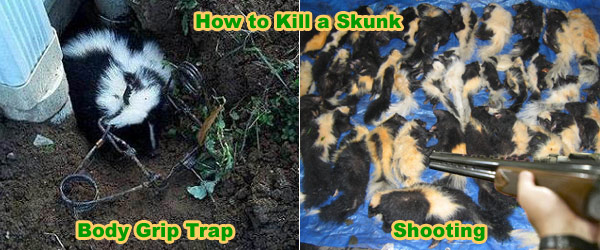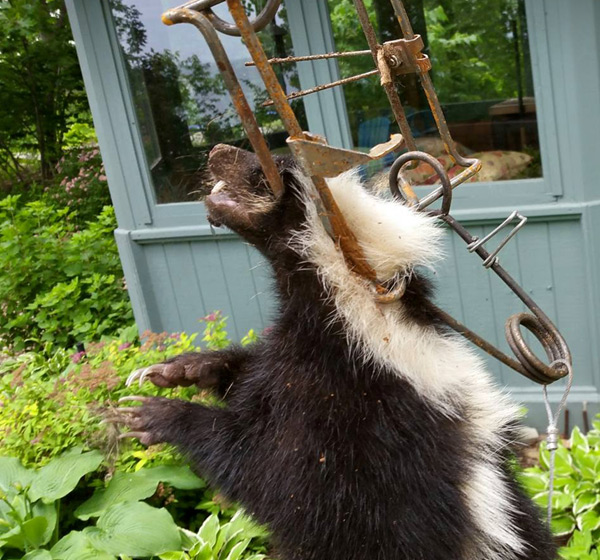- info@wildlife-removal.com
Call us for help in your town
Wildlife Removal Education
How to Kill a Skunk Without Spraying
Need skunk removal in your hometown? We service over 500 USA locations! Click here to hire us in your town and check prices - updated for year 2026.
It may actually be somewhat hard to control this. Even humans often crap their pants when they die. If you set a body grip trap, it'll sometimes work, and they'll sometimes spray. I'm guessing that
if you're reading this web page, you're not a professional fur trapper, in which there's no chance that you're going to be setting one of these dangerous traps anyway. And don't forget: if you have trouble and want to hire a pro like me, someone with experience,
click on this map of Professional Wildlife Removal Companies, and you'll find an expert in your town or city.

Shooting: As with any animal, you can also shoot the skunk, if it's legal to do so in your area.
Poison: Is there such a thing as poison for skunks? No, there is no legal or registered poison designed to kill skunks. Also, poison is a cowardly and inhumane way
to kill something. If you absolutely must kill the animal, using either a body grip trap or shooting would be better. Read the guide Should You Ever Poison A Skunk?
Cage Trap: The easiest and most effective thing to do, actually, is the trap the skunk in a live cage trap. You can read more about how to do it by clicking on
this web page: how to trap a skunk. Once you have done so, you could kill the animal, but it would be nice to relocate it
five miles away from your house. Just drape a cloth over the trap, and you can safely pick it up and put it in the trunk of your car or bed of your truck and drive it away.
I do know that in many states professional trappers (well, no one, actually) is allowed to relocate a skunk because it's a rabies vector species. The pros have gotten
very good at how to kill a skunk without it spraying. They usually kill it by lethal injection. Although there are other trappers that say "screw the law!" and
relocate the skunks anyway.

HOW TO KILL A SKUNK - More and more wildlife are being driven into residential areas as a result of humans taking over their natural habitats acre by acre through deforestation. The skunk is particularly undesirable due to its propensity to spray a sticky, obnoxious spray on unwitting victims. This is quite avoidable with the right information, but many homeowners are scared and would rather not deal. Besides, skunks are primary carriers of the dreaded rabies virus. For any of these reasons, people are driven to kill sighted skunks.
There are several ways to kill a skunk, and the major challenge while carrying out the act, is how to avoid being sprayed. This could be a dilemma because skunks almost always spray when they are killed. It is however, quite possible to kill a skunk without getting sprayed in return. Here are some methods of killing the stripped mammal:
1. Shooting
The option of shooting a skunk is more suited to rural dwellers due to the associated risk of shooting persons and pets by mistake in urban and surburban areas. Shooting a skunk seems simple enough, but it actually has other disadvantages – there’s the matter of the animal’s blood, which may have been contaminated with rabies and other zoonotic infections. These diseases are transferable to humans that are exposed to the blood of rabid animals.
2. Lethal Traps
Body grip traps are a kind of lethal trap, almost only used by old time fur trappers. They are both difficult and dangerous to use. The most common is the double spring-loaded connibear trap. They work by snapping down on the animal when sprung, and killing it via choking or squeezing. The use of lethal traps are inhumane and mostly impractical because they pose a danger to neighborhood dogs and cats. Dealing with the carcass is also not a pleasant affair. Lethal traps are banned in some states
3. Poisoning
The option of using poison to kill a skunk comes easily to mind for many homeowners. For one, laying out poison for a pest can often be trailed by unforeseen consequences, where household pets get killed after getting to the poison first. It is also largely ineffective as it may result in bigger issues for the homeowner and a lot of suffering for the animal. The poison used in some cases only makes the animal sick and suffer greatly before recovering again. In the instance that the poison does work, chances are high that the skunk will crawl into a dark, tight corner on your property to die. When this happens, you wake up in a couple of weeks to a horrible stench that will stick around for a long time.
Poisonous substances used on skunks include Anticoagulants like warfarin, Antifreeze (Ethylene glycol)
Bromethalin (rat poison), Cholecalciferol, and Strychnine. It is illegal and downright inhumane to poison skunks, there are better ways to dispose of them and these should be explored instead. If you want good alternatives, read my how to get rid of skunks page
for step-by-step tips.
4. Other Inhumane Means
For the fear of being sprayed, or unfounded concern about if skunks are dangerous to cats or dogs people go to extreme lengths while trying to kill skunks. These unsavory and highly inhumane methods include drowning, injecting acetone (nail polish remover) and other chemical solvents into a skunk’s chest with a long pole syringe.
How to Avoid Getting Sprayed When Killing a Skunk
A skunk will almost always spray when it is killed and your best bet for not getting sprayed is of course, for you to be a good distance away. This is why a lot of people opt to shoot, but by all means, do this only if it is safe to. Lethal body grip traps may also work for spray avoidance on your person, but the stink will then hang around your property. The best method still remains to live trap the skunk and relocate it somewhere else. If you take the necessary precautions, you will never get sprayed while doing this.
It is really not necessary to kill skunks, plus it is generally not a good idea because of the stink that will follow. If you feel that you need assistance to live trap and dispatch a skunk, do enlist the help of a wildlife expert.
Note: Always wear gloves and other protective gear while handling skunks, carcasses and contaminated equipment. Dispose of carcasses properly by placing them in a plastic bag and burying in the ground.
For more information on skunk biology and behavior, and for a recipe to remove skunk spray odor, go to my skunk removal information page.
Skunk Email From Reader: Good Morning, we have a skunk underneath our house in Mill Valley. We have seen him and heard him coming and going and we have smelled him as well.
He has gained access to the underside of our house from a small door on the east side which also allows us access. It is a crawl space at least to get in there. My partner has left you
a message this morning on your phone. We are anxious as we have two small dogs. Please call either of us asap. There is no need for us to meet you at the house as it will be obvious
to you how to gain access as I have described it above. However if its necessary we will meet you there.
My Response: It'll be no problem to trap and remove your nuisance skunk, and to install an exclusion barrier around the perimeter of your home to keep out all wildlife, if you so desire.
Skunk Email From Reader: Hello - I was wondering if it would be possible for you to remove a skunk. I have him already trapped and in my backyard. I just don't know what to do with him now.
Would you be able to come get him? Would there be a cost involved? Would you have to kill the skunk? Any information would be appreciated. I live in Greene County, VA. Thank you, Jennifer
My Response: Jennifer - I do not service your area, but someone on my nationwide directory does. It's very common for wildlife trappers to come help with skunks that other people have
trapped. I don't know the laws in Virginia, so I don't know if the skunk will have to be killed or not. If you don't want to trap or kill, I recommend live trapping, because skunk repellent isn't effective.


















